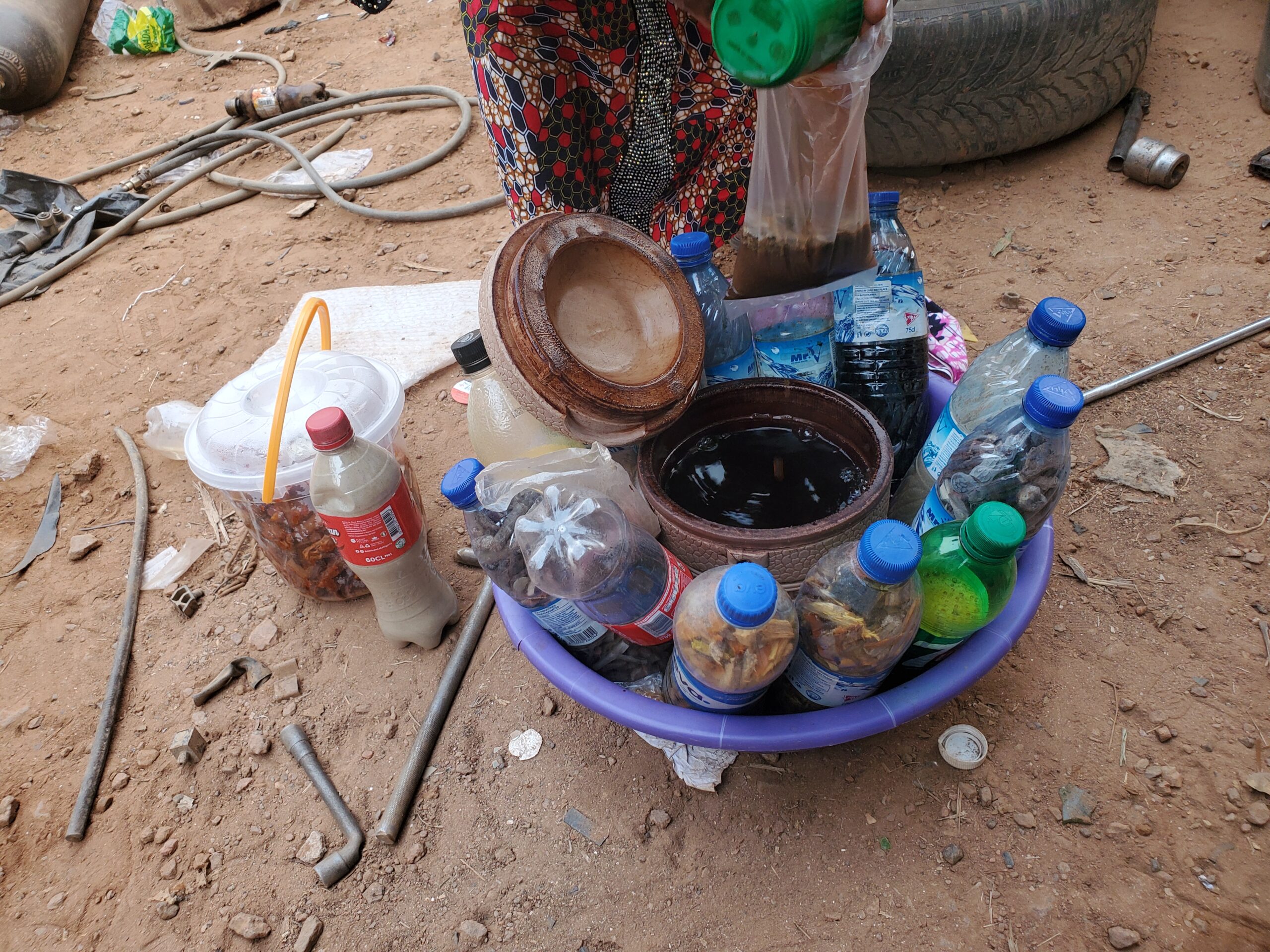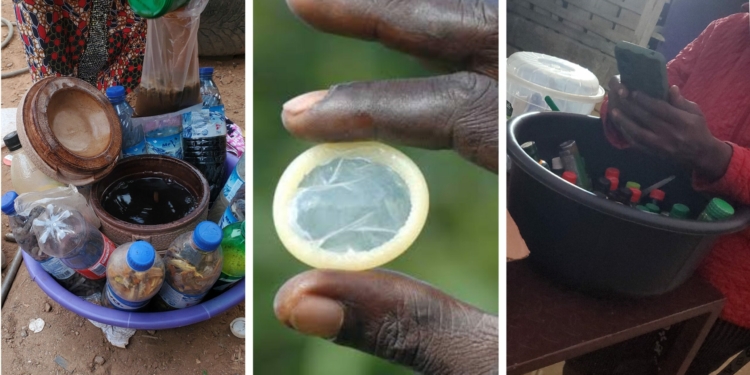On a Sunday morning, Within Nigeria journalist SODIQ LAWAL CHOCOMILO toured four locations in Ilesa, a town in Osun State where people use herbal remedies as a substitute for prescription pharmaceuticals to cure waist pain, malaria and sex-related illnesses such as gonorrhea, syphilis, as well as to improve their sexual performance.
This story illustrates not just how Nigerians use street-side herbal remedies in place of conventional medication, but also how their financial constraints stem from the exorbitant price of pharmaceuticals.
It also shows that Nigerians recklessly consume without considering the origin or method of making these herbal mixtures, and instead indiscriminately take them without seeking NAFDAC permission.
A few Nigerians testified that they were entirely cured of their illnesses after consuming these herbal concoctions, in addition to stories meant to soothe anxieties.
At least six males in their thirties, forties, and maybe fifties, respectively, approached a woman in her late-thirties who was rushing to serve a cup of a concoction of substances, either powdered or liquid, that she had made at home, around 6:58 p.m. Nigerian time.

The reporter heard the males repeatedly ask the young woman, “Give me Ale, Opa eyin, atoba, afato, jedi,” as some young guys were spotted drinking alcohol (seaman in nylons) at a nearby closed kiosk.
When the reporter approached the herb seller, he discovered that she would place her used stainless cups into a plastic bucket filled with a small amount of water. After lifting the used cup from a bucket of water, the herb seller proceeded to use it to serve customers. Concerns regarding the hygiene of the surroundings, cups, and the health of prior users of the cups don’t seem to concern the herb sellers or her customers..
The reporter informed the young lady that he was suffering from malaria. In his native Yoruba language, the reporter kindly begged the woman, “Give me a strong herbal concoction for malaria and pile.” She questioned the reporter, “Do you want an alcoholic or non-alcoholic one (made with water or honey)?” The reporter requested, “I prefer a non-alcoholic one but kindly sell it inside a nylon”
With dismay, the reporter watches as she prepares the herbal mixture, pouring some of the contents of a cooler full of hot water inside the nylon and adding a spoonful of some sort of yellow powdered item after measuring out an unknown amount of liquid substance from a container. The reporter then moves to a wooden bench where other customers were sitting, wondering if the young woman and her consumers are aware of the risks involved.
Which herbal mixture—alcoholic or nonalcoholic—is more potent? When the reporter questioned, a young man in his early thirties answered that it’s the alcoholic one. The alcoholic one is stronger and better, I can assure you having been drinking it for weeks. He said, “I always feel lighter after drinking the alcoholic one and always empty my bowels.”
The young man, subsequently identified as Lekan, revealed that although he dislikes taking these herbal remedies, he is forced to do so since his diet is high in starchy or sugary foods, which makes him prone to piles.
“I used to purchase a prescription medication for N350 to treat the pile whenever it happens. I stopped buying it as the price went up to N700. This location was recommended to me by a friend. A cup of herbal mixture for piling costs N200, and it can also be sold for N150. Lekan stated with a hint of happiness.
“Every time I take it, I always empty my bowels easily. We also come here to consume herbs meant to treat sex-related diseases because a pack of condom is now N500 and they don’t last. So we come here to take herbs after having unprotected sex”.
So you would rather use herbal remedies (Agbo) than pharmaceuticals? This reporter enquired. Lekan was drinking a liquid substance to wash down the powder that he had already swallowed. Before he could reply, another man, who was presumably in his late forties and was only called Segun, informed the reporter that he had made it a habit to take herbal remedies for malaria twice a week in order to prevent being killed by fever.

My family of seven depends on my making just enough money to feed them. I don’t have the money to get sick and pay auxiliary nurses or visit a pharmacy to purchase a N2,500 malaria medication like lonart DX. It is preferable that I treat the fever before it manifests. Segun continued, “Every Sunday and Thursday, I come here.”
Did a doctor advise you to drink a cup of herbal concoction on Sundays and Thursdays to prevent malaria? The reporter followed up with another inquiry. Segun added that he takes it to avoid malaria even though no one has recommended it.
Another consumer identified as Babajide told this reporter that the increase in prices of drugs forced him to patronize herb sellers because it is cheaper.
Babajide, a bike man probably in his early thirties told WITHIN NIGERIA that his journey to patronizing herb sellers started when he contracted gonorrhea and he was asked to pay the sum of N15,000 by a nurse to treat him.
I opted for drugs because she wanted to give me an injection. I contacted a friend who recommended Azithromycin 500mg or Cefixime 400 mg as drugs that can cure gonorrhea. I visited more than three pharmaceutical stores and the prices of these drugs range from N1700 to N2500. Original Amplicox is N1500. I could afford Amplicox but it can’t work alone. So I did not buy it at all. I went to a herb seller and she gave me a cup of herbal concoction which I repeated for four days. It only cost me the sum of N1000, Babajide narrated.
Babajide gave a negative response when the reporter followed up to ask if he had undergone any medical testing to see whether he actually had gonorrhea or to confirm if the illness had left him after taking the herbs.
I didn’t take any tests, but I could tell I was getting better because I could urinate easily. He went on, “I can’t be wasting money meant for food on drugs or tests.”
When Tolulope Adelani was required to purchase a medication, 1mg of Augmentin, for N13,000 in order to cure urinary tract infections, he turned to herb vendors for assistance.
Tolulope informed this reporter that he was experiencing severe exhaustion and trouble peeing, which prompted him to see a doctor who asked that he should undergo a medical test.
It turned out that I had urinary tract infections after I took a test. My doctor prescribed Augmentin among other medications. I was startled to learn that it costs N13,000 when I went to a pharmacy to acquire it. Before I noticed the price tag, I believed the woman who was tending to me was making a joke. I didn’t voice any complaints. I just left the store,” he explained.
I told my friend Kazeem about my experience, and he suggested that I go see herb sellers. I eventually encountered “Iya Emma” after inquiring around, and she pointed me the herb seller who was a little distance away. She made me a strong herbal mixture to take and asked me to bring N10,000. She instructed me to take three cup-filled in the morning and evening using the tiny cup on a Seaman bottle. After five days, I started to notice changes. A delighted Tolulope went on to say, “She saved me the sum of N37,000.”
When the reporter inquired as to whether Tolulope had ever questioned the process used to make the substance he consumed or the water that was used, he replied that he was more concerned with curing the infection and that he could always use medications to treat typhoid or any other water-borne illness that might have originated from it. He expressed doubts about this because he never became ill after the herbal remedies helped him treat the infection.
The issues with herbal mixtures, according to lecturer and businessman Adekanmi Peter, include cleanliness and lack of specificity in regards to dosage.
Adekanmi, who accompanied his friend to the location but did not take anything, informed the reporter that he had a severe upset that almost cost him his life while recounting how he nearly lost his life owing to powdery material and liquid he drank as herbs for a pile.
“I’ve treated my pile with medications, but it bothers me still. I chose to go up to a herb vendor and voiced my displeasure with the pile. She gave me two things: an extremely bitter liquid and a powder that she termed “Agunmu.” After swallowing them, I left for home. The next day, at just 1:30 a.m., I got out of bed and went to the bathroom. I was there for around forty-five minutes. I passed blood and emptied my bowels. He described how his wife had to shout for me to be carried to the hospital where I was treated with the assistance of neighbors.
In response to a question concerning his activities at the location if he did not use herbal remedies, Tolulope revealed that he had followed a friend to the location, gesturing to another young man.
Following work, we all head home together. We have been going to office together to reduce transportation costs since the removal of fuel subsidies. He said to me that before he leaves for home, he wants to take “Jedi.” Other than to bide my time, I have no choice. Tolulope continued, “We’re going home as soon as he finishes up.
In an interview with WITHIN NIGERIA, Pharmacist Ogunwale Olufemi said that the rising demand for herbal cures is unavoidable and is mostly caused by the majority of people’s restricted purchasing power and the extremely high cost of drugs.
The pharmacist claims that herbal medicines have been used for ages because they are inexpensive, easily accessible, and effective—and they don’t have the negative side effects associated with conventional medicine.
Ogunwale revealed that drugs are necessary goods for health and that any responsible government should work with all relevant parties to find ways to make them more reasonably priced and easily available across the country, even as he promoted herbal remedies as a superior option.
“Since NAFDAC is not a government revenue agency, they ought to lower the fees and promote the manufacturing of herbal remedies and drugs locally. He went on to say, “They ought to instead concentrate on the regulation of standards, such as good manufacturing practices and toxicology.”
When contacted by this reporter, Doctor Wasiu Adetokunbo, the medical director of Aramide Hospital in Ibadan, Oyo State, informed WITHIN NIGERIA that while herbal pharmaceuticals, like as concoctions (Agbo) or powdered substance (Agunmu), are not inherently evil, the abuse of these treatments by Nigerians is the issue.
The medical director claims that there is no precise dosage for herbal medications used to cure illnesses.
With the use of an abuse case study, Adetokunbo clarified what would happen if a person took 10 spoons for a certain illness instead of the recommended daily dose.
He went on to say that in the event that the same ten spoons are used again, customers would triple or double the dosage in the belief that doing so would prevent the ailment from recurring and maybe causing harm to other body organs.
“You are aware that using herbal medications excessively might harm the liver and kidneys. Remember that one of the liver’s and kidneys’ roles in detoxification is to eliminate toxic waste from the body. The liver and kidneys would find it challenging to reabsorb, detoxify, or absorb. The blood will be in risk as a result.
Nevertheless, it would be excellent if someone conducted research on the usage of herbal remedies in Nigeria as a substitute for pharmaceuticals that have become too expensive. The cost of medications has increased to the point where some people are unable to purchase a prescription for hypertension medication. Herbs are also used in other countries, although they are processed by producing syrups or pills. In order to benefit the people and help them, we can also do the same thing here by making these herbal medications appealing.
However, we still need to improve the drug’s dose and manufacturing processes. Keeping oneself clean is essential to the manufacturing of drugs. The manufacturing of pharmaceuticals requires particularly hygienic, orderly, and clean conditions. Our lack of hygiene notwithstanding, he stated, “I think it will work and make drugs more affordable for the general public if we can allow hygiene to take its place, work on dosage and packaging, roll out side effects and necessary precautions”.




Discussion about this post